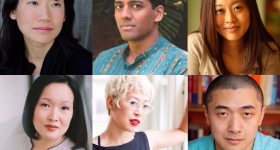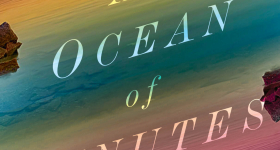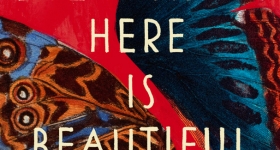Around this time last year, there was a special exhibit at the Yale Center for British Art on the work of William Hunter, a 19th century Scottish anatomist. An influential obstetrician, Hunter was most notable for authoring The Anatomy of the Human Gravid Uterus Exhibited in Figures, a text that featured hundreds of illustrations of fetuses in utero — the first detailed, meticulous images of the pregnant human body.
In Hunter’s illustrations, the women are stripped entirely of any identity, leaving only flesh and sinew. His images were based on the corpses of pregnant women, most likely ones who were poor and had just died. In one drawing, the tissue over the cadaver’s stomach is peeled away, revealing the lump of the fetus underneath. In another, the curled, dead fetus, with its face still puckered and raw, peers over its mother’s severed legs. While none of the women’s faces are visible, through all the careful labeling and penmanship, we are haunted by the male hands that have claimed and dissected their bodies.
![]()
***
I thought of this exhibit as I read Jenny Zhang’s explosive new poetry collection, My Baby First Birthday. Like Hunter’s illustrations, Zhang’s poems detach the body from any sense of personhood. Vaginas are removed sardonically from the femme body, “leashed to a tree / and wav[ing] hello to everyone / like hi like hi like hi hi hi” (“My baby first birthday”), while thighs and breasts are compared to mere “squiggles of raw meat / vacuum sealed” (“we were lonelier in there”). Bodies are hollowed out, cleaved and reduced into parts, “just holes…ugly appendages…an orifice” (“needs revision!”). Images of motherhood are also distorted and transformed into the grotesque, as the speaker details in “THE LAST FIVE CENTURIES WERE UNEVENTFUL”:
I wanted to have milk oozing from my tits…
I wanted to drink my own milk and breastfeed myself
I wanted to breastfeed my mother and tell her I love her
I wanted to miscarry a baby by falling down the stairs
I wanted to toast to my own miscarriage with breast milk from my tits
As in other poems in My Baby First Birthday, dissonances between breastfeeding and miscarrying are mentioned while the paradigms of mother and child are destabilized. Breastfeeding becomes a taboo, self-flagellating performance; a miscarriage becomes a cause for celebration. Mirroring the cruelty of Hunter’s dissections, in Zhang’s work, the illusions of maternity — its many constructions of nurture and warmth — are stripped away.
My Baby First Birthday is split into sections representing the four seasons. In each section, the speaker is born and reborn; “Fall,” “Winter” and “Summer” contain a “My baby first birthday” poem. Yet, these birthdays are far from celebratory, and it becomes difficult to map change in this collection. Each section seems to devour the next; the speaker grows increasingly infuriated at, as well as disoriented by, having been “born without consent.” In “there is only world,” the speaker announces, “anyone who birthed me / was wrong / to expect gratitude…did you ask to be born? / to think the very first moment / happened without you knowing.” The book propels itself forward, furiously and voraciously, with this very question: What does it mean to be born into a body that can feel so much pain, upon which others can inflict so many forms of violence?
***
I read Zhang’s debut collection of short fiction, Sour Heart, when it was first released in 2017. As a young Chinese American woman whose only prolonged exposure to Asian American fiction had been reading The Joy Luck Club in high school, I was instantly struck by Zhang’s descriptions of young Chinese American women shitting, pissing, masturbating, cutting up their own shit with chopsticks, being cruel, being loving. Later, I found myself devouring all of Zhang’s essays in Rookie on topics that ranged from a critique on individualism to calling out Weezer on their Yellow Fever. All of these pieces spoke to my own simultaneous disgust and fascination with my own body — a thing so objectified, fetishized and exoticized that I felt that I could barely recognize it.
Zhang’s work is acutely aware of this feeling — the feeling of not being entitled to your own body. Like her fiction, Zhang’s poetry turns the objectification of femme bodies of color onto her own, pummeling forward with a cruelty that makes visceral what it feels like to live in these bodies. It is a difficult and uncomfortable kind of cruelty, though one from which it is hard to look away. In the first appearance of a “My baby first birthday” poem, Zhang writes:
my detachable pussy is not afraid of being
approached by a man at night
who is like hey girl
you don’t need none of that
and I feel very sexy
“Flush in the spiral of black holes” also exemplifies Zhang’s ability to blur lines among acts of fucking, vomiting, ejaculating and going into labor, transforming them into acts of both harm and of care. The speaker insists that even their “puke” does not want them; “wouldn’t it have stayed inside,” Zhang writes, “wouldn’t it have said hi and been more reasonable and less lonely…I am someone who has no where to go no mother to live inside.” In the world of My Baby First Birthday, there are no safe spaces outside of a mother’s womb — a space that may also repel you.
Zhang’s anatomization of her own body writes back against the legacy of White violence that has commodified the pain of femme bodies of color for centuries. “the more I talk about my pain,” she writes in “needs revision!,” “the more white people literally profit.” In her essay for Buzzfeed on the controversy instigated by White poet Michael Derrick Hudson — who used a Chinese pseudonym when submitting poetry as a “strategy” for publication — Zhang wrote that Hudson wanted a name that gave him “an ‘edge’ without having to endure racism, erasure, tokenization, self-devaluation and the constant requests for free intellectual labor,” adding, “I don’t think Hudson wants to be a chink.”
My Baby First Birthday probes at this question of commodification: Why must femmes of color, or all disenfranchised bodies, display our pain and trauma in order to be heard and remembered? Why does it take me calling myself a chink to make myself real and visible?
My Baby First Birthday probes at this question of commodification: Why must femmes of color, or all disenfranchised bodies, display our pain and trauma in order to be heard and remembered? Why does it take me calling myself a chink to make myself real and visible? Zhang is at her strongest when she subverts this commodification, foregrounding the complications and nuances of Asian American identity. This is evident in “HAMMER,” which chronicles Asian American girlhood alongside the rise of Chinese American figure skater Michelle Kwan. In the poem, Zhang’s speaker recounts an interaction with a woman from Wuhan:
[she] followed me into the bathroom
and stared at me staring at her staring at me
until finally she asked for my autograph
thinking that I was her favorite figure skater
I scribbled, “with love, Michelle <3”
it was the only time I had been glad
to have been mistaken for someone else
who had been mistaken for an other
The speaker’s gratification from being misidentified as Kwan quickly dissolves into a realization that she has been anonymized, transformed into “an other.” It is also striking that this anonymization occurs along transnational lines, as the speaker is misidentified by yet another Asian woman. The speaker goes on to recount the newspaper headlines that plagued Kwan in her early career: “American beats out Kwan,” “American outshines Kwan.” Later, she concedes, “I’m not afraid to love someone / who doesn’t see me…how did two Chinese girls ever think / we would be someone?.” As Zhang outlines, Asian American girlhood is painful; it requires existing in, perhaps even having to love, a space that violently refuses to recognize you.
***
While My Baby First Birthday persists and almost delights in its dissection of the femme body, it is also targets the larger structural forces that make this cruel disfigurement possible. Along with threads of birth and procreation, there is also the imminent, ever-present threat of extinction — one propelled by structural forces of White supremacy, patriarchy and capitalism. Poems are addressed to an unnamed “you,” a figure that seems to stand in for those who have benefited from those structural inequalities: White men with “a v diverse portfolio / of stolen land” (“castles in the air for the very very”), those who inherit “family money” and “buddies from harvard and yale” (“ted talk”), those who remain “solidly middle class” though their “granddadd[ies]” are “oil barons” (“why would you ever be friends with her?”).
In these poems, the gulf between the “you’s” and “I’s” of My Baby First Birthday becomes clear. There are those, like Zhang’s speaker, “not born / with the right to anything” (“HAMMER”) — not their own bodies, their traumas, or narratives — and those whom the speaker describes in “it’s spring”: “you’ll want more of me to vanish / more and more and more / until all of us are gone.” The danger of White supremacy is what drives the book’s focus on fertility and reproduction — a way to ward off extinction.
I thought of these notes on extinction, as well as Zhang’s essay on Hudson and yellowface, as I read the book’s most scathingly titled poem, “I’m a 30 year old White non racist male, with some of my closest friends being Black. That being said”:
your champion shoes bother me
your double eyelid from birth bothers me
your diatribe against surgery bothers me
your hatred of fake tits bothers me
your hatred of real tits bothers me
When Zhang enters the White body, her revelations are frightening — it is the very existence of the femme body of color, or any nonwhite body that endangers the inheritances of Whiteness, that “threate[n] your family line” (“Great”).
My Baby First Birthday bristles with an anger at being misidentified, excluded, Otherized, reduced to body parts like this. This anger is palpable, burning through the pages: “I feel nothing but hatred hatred hatred hatred,” reads the sparse, enlarged title of one poem. At a time when notions of liberal inclusivity and diversity seem to dominate discussions on Asian American empowerment, Zhang is less interested in being included in the fabric of America than stripping it until it is threadbare.
***
For a book that blazes with anger, the power of My Baby First Birthday comes from its core humanity, its lingering moments of tenderness. In the end, the secretions, dissections and reproductions in the text serve as forms of commemoration, of insisting to be remembered and touched when the world around you refuses to do so. Zhang’s speaker smears spaces with her own secretions: “I notice my goo trail / going everywhere I go / into the recommended museums / eating at the recommended restaurants” (“from the dead dark into the green”). The book’s fixation on procreation also speaks to the very human anxiety of wanting to “mean something to the world” — to be told, “stay / you are needed / and we are needed” (“The Universal Energy Is About to Intervene in Your Life”).
Some of the most moving moments in My Baby First Birthday are the ones that are the most vulnerable, that call for intimacy. “I knew I would want to want more,” Zhang writes in “Everyone’s girlfriend,” “and I knew I want to be buried with everyone / with the dead stars that lead you home / with the child I won’t have.” Especially at a time when intimacy is actively discouraged, the speaker’s calls for nearness feel more urgent than ever. In “with my mother in nice,” Zhang writes:
I’m going home
where the dinosaurs perished
where my grandfather was buried
we touch his body
we know his entire life
we see it as clearly as ever
Intimacies such as these are efforts to reconnect body parts severed by male violence, families separated by diaspora. Zhang’s collection ultimately proves it is possible to begin undoing the violence of William Hunter — of Whiteness, xenophobia and patriarchy — by returning the baby back to the womb, by restoring the body — reclaiming it as, in the words of the closing poem, “SOMETHING SOFT RADIANT AND GOOD.”










Comments